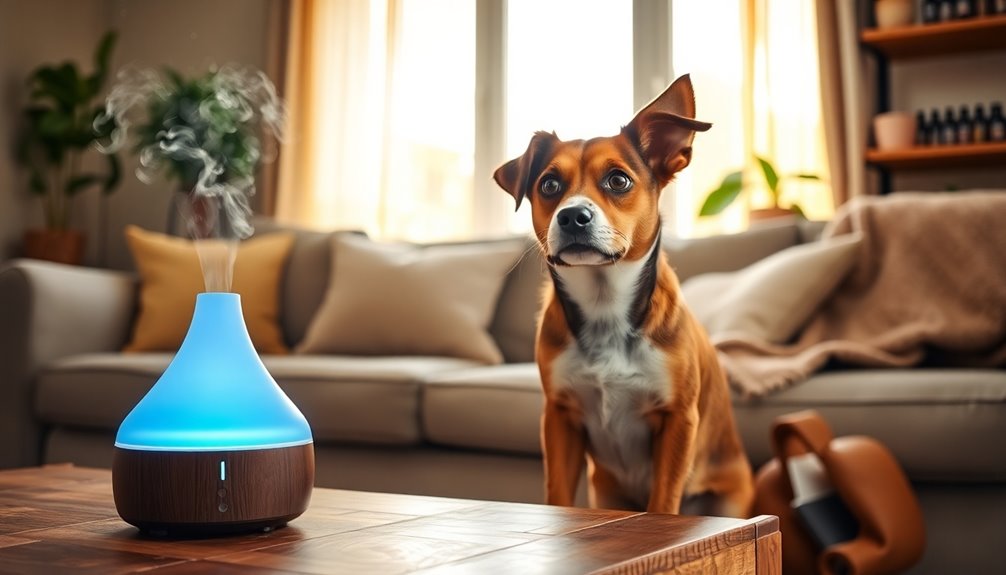Aroma diffusers can be risky for your dog, and it's important to be cautious. Dogs are sensitive to scents and certain essential oils, like tea tree and citrus, can be toxic. Symptoms of toxicity include drooling, vomiting, and lethargy, so watch for any unusual behavior. To keep your pet safe, consult your vet before using any oils. Opt for passive diffusers or dilute oils to reduce risks. Always ascertain good ventilation. There are also pet-safe alternatives that promote relaxation without harmful effects. If you want to know which oils to avoid or safe options to evaluate, keep going!
Key Takeaways
- Essential oils can be toxic to dogs; consult a veterinarian before using diffusers around pets.
- Dogs' heightened sensitivity to scents increases the risk of adverse reactions from essential oils.
- Use passive diffusers, like reed diffusers, to minimize inhalation risks for dogs.
- Ensure proper ventilation when using aroma diffusers to protect your dog's respiratory system.
- Monitor your dog's behavior closely when introducing new scents to detect any discomfort or adverse reactions.
Understanding Essential Oils
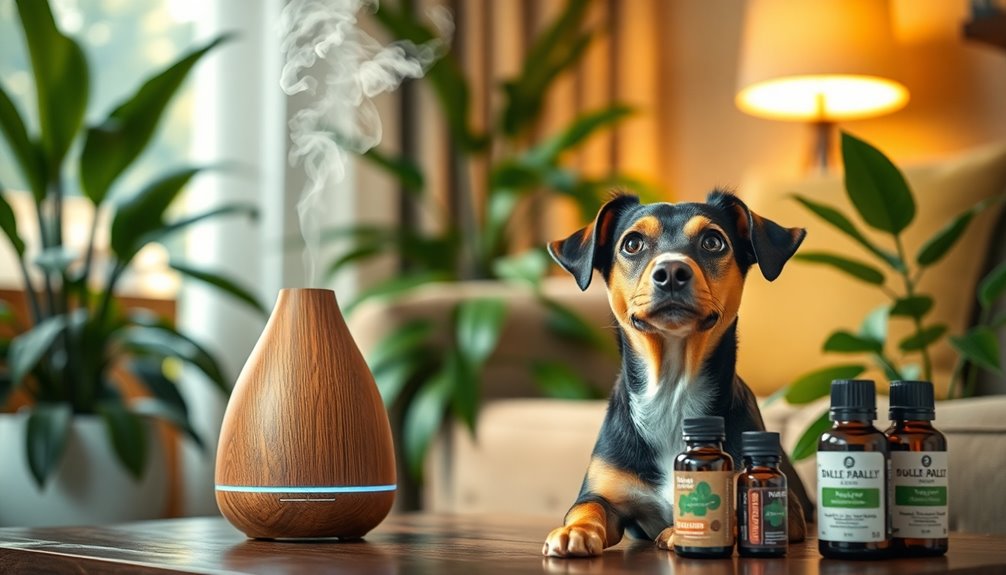
When you consider using essential oils, it's important to understand what they really are. Essential oils are highly concentrated plant extracts, produced through distillation or cold pressing. They offer various health benefits for humans and are popular in aromatherapy. Additionally, some essential oils are derived from herbs, flowers, fruits, or spices, which are also used in herbal teas. It's essential to be aware that some oils have toxic properties that can affect your dogs' health.
However, you must be cautious when using essential oils around pets. Not all oils are pet safe; some can be toxic to dogs. Dogs and essential oils don't always mix well, as pets can absorb these substances through their skin and mucous membranes. This heightened sensitivity can lead to adverse reactions. It's crucial to dilute oils significantly before using them around dogs to minimize risks. Studies have shown that emotional dysregulation can occur in pets exposed to certain essential oils, leading to behavioral changes.
If you're thinking of using essential oil diffusers or other forms of essential oils, consult your veterinarian to guarantee you're making safe choices for your furry friends.
Pet Reactions to Essential Oils
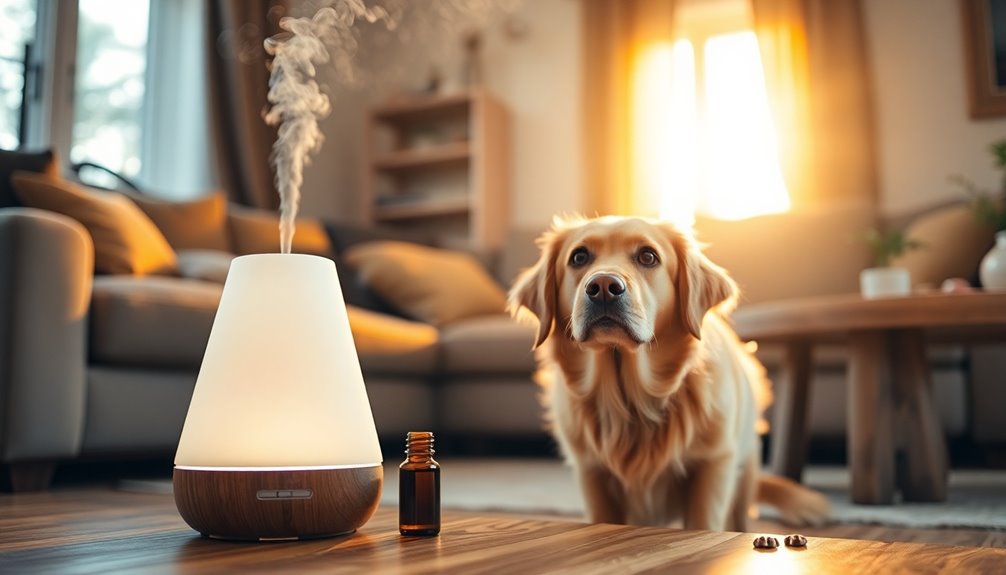
When it comes to essential oils, your pets' sensitivity to scents can lead to unexpected reactions.
Unlike dogs, who can handle some oils thanks to their liver, cats lack the enzymes needed to process them safely.
It's crucial to pay attention to how your pets respond and consult a vet before introducing any new aromas into your home.
Sensitivity to Scents
Because dogs have an extraordinary sense of smell, they often react more strongly to essential oils than we do. Their heightened sensitivity to scents means that concentrated fragrances can cause discomfort or adverse reactions, including respiratory distress.
As a pet owner, it's vital to recognize that essential oils can be absorbed through your dog's skin and mucous membranes, leading to potential toxicity. Common signs to watch for include excessive salivation, vomiting, or changes in behavior, such as agitation or attempts to escape.
Always make certain the oils you use are safe for dogs, and be vigilant in monitoring your furry friend's reactions. Each dog is unique, so what works for one may not be safe for another.
Metabolism Differences Explained
Understanding how dogs metabolize essential oils is key to ensuring their safety around these products. Unlike humans, dogs have a less efficient metabolic process, making them more susceptible to potential toxicity. Regular exposure to certain substances can also lead to increased sensitivity in dogs over time.
Here are some important points to reflect on:
- Dogs can't eliminate essential oils as effectively through their liver.
- Concentrated essential oils, like tea tree and eucalyptus, can be toxic even in small amounts.
- Heightened scent sensitivity may overwhelm dogs, affecting their respiratory tracts.
- Inhalation, ingestion, or skin absorption can lead to adverse reactions.
- Always consult a veterinarian before using any essential oils, as reactions can vary among dogs and potentially be toxic to cats. Establishing healthy boundaries with the use of these products can help protect your pet's well-being.
- Additionally, certain environmental factors may contribute to increased risks of adverse reactions in dogs, similar to how noise exposure impacts hearing loss in humans.
Being informed helps keep your furry friend safe and healthy!
Risks of Essential Oils for Pets

When using essential oils around your pets, it's crucial to be aware of the risks involved.
Some oils, like tea tree and eucalyptus, can be toxic and lead to serious symptoms such as vomiting or respiratory issues. Additionally, essential oils can be absorbed through the skin and may lead to adverse effects if ingested or improperly used.
Always monitor how your pet reacts and consult your vet before introducing any new scents into your home. Additionally, certain scents can trigger adverse reactions in pets, so it's best to choose oils that are known to be safer for them.
Toxic Essential Oils Identified
While you might enjoy the soothing scents of essential oils, it's essential to recognize that some can be highly toxic to your dog. Certain essential oils can lead to severe health issues, including poisoning and even seizures.
To keep your pets safe, avoid using the following toxic oils:
- Tea tree oil
- Pennyroyal oil
- Wintergreen oil
- Cinnamon oil
- Citrus oils
These oils can cause symptoms like drooling, vomiting, and breathing difficulties. Furthermore, it's crucial to remember that just like some fruits, such as grapes are toxic to dogs, essential oils can have harmful effects on their health.
Even oils labeled as "natural" can be harmful due to their concentrated forms. Always consult your veterinarian before using any essential oils around your pets.
Inhalation and Absorption Risks
Using vital oils around your pets can pose significant inhalation and absorption risks that you should be aware of.
When diffusing essential oils, microdroplets can be inhaled or settle on your pet's fur, entering their bloodstream through skin and mucous membranes. This can lead to potential toxicity, especially for pets with existing respiratory issues.
Dogs are particularly sensitive to strong scents, which may cause respiratory distress or discomfort. Symptoms from exposure can include excessive salivation, vomiting, and lethargy.
It's important to consult with a veterinarian before using essential oils around your pets to guarantee their safety and well-being. Prioritizing their health will help you avoid serious inhalation risks associated with these products.
Symptoms of Toxicity
Essential oil toxicity in dogs can manifest through various alarming symptoms, so it's crucial to recognize them quickly. If you notice any of these signs, contact your vet immediately:
- Drooling
- Vomiting
- Diarrhea
- Lethargy
- Respiratory distress
High concentrations of certain essential oils, like tea tree and peppermint, can be particularly harmful, leading to severe health issues.
Dogs exposed to these poisonous substances might develop dermatitis from skin contact or exhibit breathing difficulties due to inhalation. Furthermore, it's essential to be aware that some oils can be used under the guise of spiritual guidance while posing risks to pets.
Always monitor your pets after exposure to essential oils and consult the ASPCA for detailed lists of toxic options.
Being vigilant about these symptoms can save your furry friend from serious health complications.
Toxic Essential Oils for Dogs
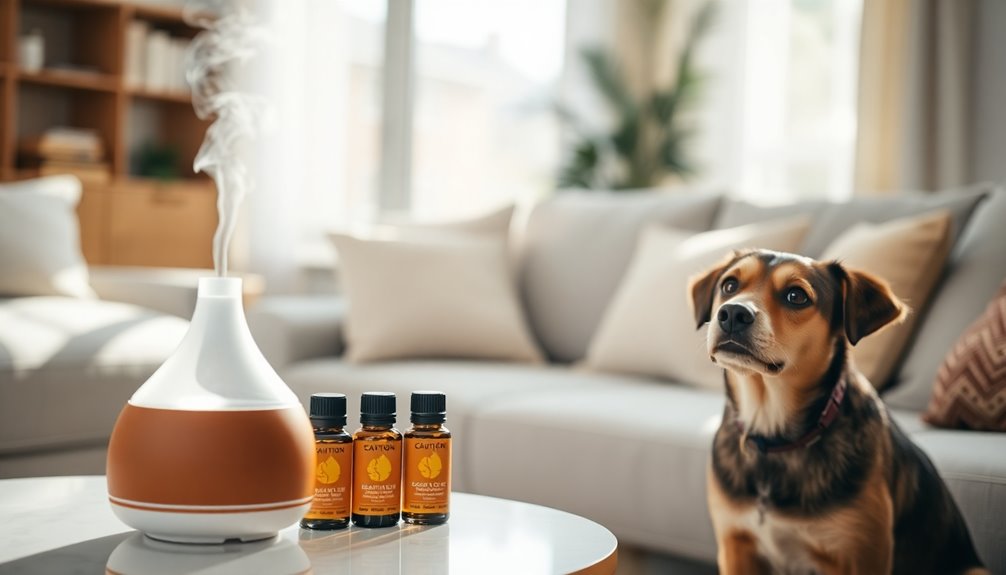
When it comes to keeping your dog safe, knowing which essential oils are toxic is crucial. Some essential oils can cause serious health issues for dogs.
Tea tree oil, even in small amounts, can lead to drooling, vomiting, and seizures.
Pennyroyal oil is especially dangerous, potentially causing severe liver and nervous system damage.
Eucalyptus oil can result in excessive drooling, vomiting, diarrhea, and respiratory difficulties if inhaled or ingested.
Additionally, cinnamon oil may irritate the skin and lead to liver damage, while ylang-ylang oil is linked to skin irritation and nausea.
To guarantee your furry friend stays healthy, always avoid these toxic essential oils and consult your veterinarian if you have concerns.
Signs of Essential Oil Poisoning
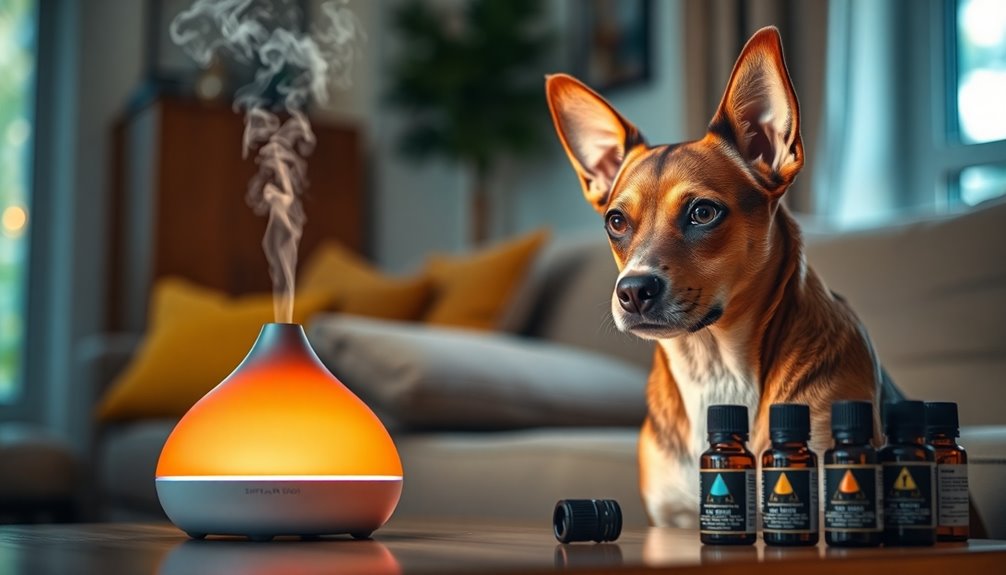
Recognizing the signs of essential oil poisoning in dogs is important for their well-being. If your dog has been exposed to essential oils, keep an eye out for these symptoms:
- Vomiting
- Lethargy
- Difficulty breathing
- Respiratory distress
- Neurological signs (like disorientation or tremors)
These signs indicate your dog may be experiencing essential oil poisoning, which can escalate quickly.
Excessive salivation and distress are common reactions, especially with toxic oils like tea tree or wintergreen. Even small amounts can lead to severe health issues, so it's imperative to act fast.
If you notice any of these signs, seek immediate veterinary attention. Early detection can make a significant difference in your dog's recovery.
Safe Practices for Pet Owners

After understanding the signs of essential oil poisoning, it's vital to contemplate how to safely incorporate these products into your home if you have a dog.
First, always consult your veterinarian before using essential oils; they can guide you on safe practices tailored to your pet's needs.
Dilute essential oils with a carrier oil to minimize their potency and reduce irritation risk.
Opt for passive diffusers, like reed diffusers, to lessen harmful inhalation exposure.
Guarantee proper ventilation to protect your dog's sensitive respiratory system.
Finally, monitor your dog's behavior closely when introducing new scents, watching for any signs of discomfort or adverse reactions.
Additionally, ensure that your home is equipped with essential safety equipment to quickly address any potential emergencies related to essential oil use.
These steps can help you enjoy the potential health benefits of essential oils while keeping your furry friend safe.
Essential Oils to Avoid
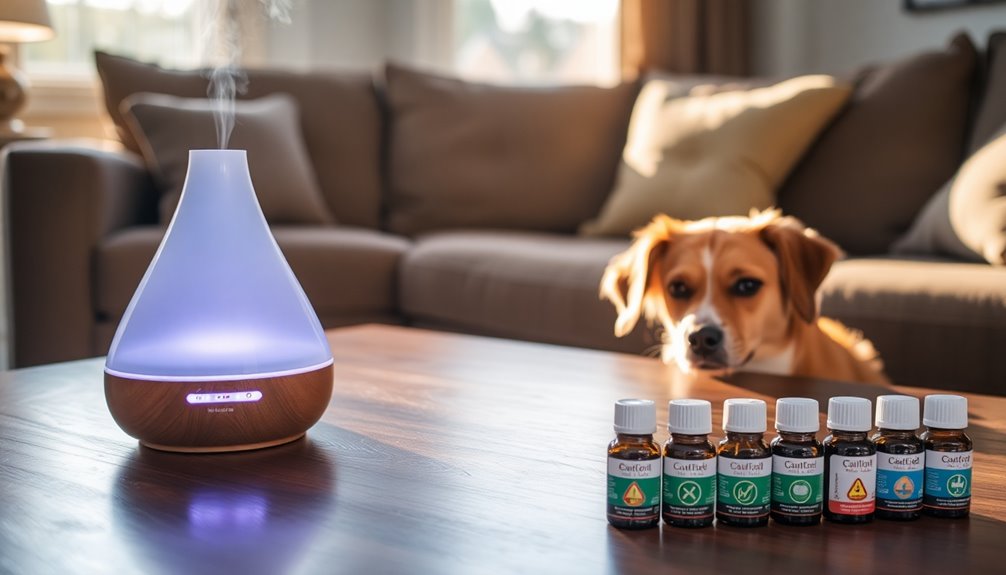
While essential oils can enhance your home environment, certain oils pose serious risks to dogs and should be avoided.
Here are some essential oils to avoid when using diffusers around your pets:
- Tea tree oil: Can cause drooling, vomiting, and seizures, even in small amounts.
- Pennyroyal oil: Highly toxic, it may lead to liver damage and affect the nervous system.
- Eucalyptus oil: Linked to excessive drooling, vomiting, and breathing problems in dogs.
- Wintergreen oil: Contains methyl salicylate, potentially causing severe gastrointestinal and neurological symptoms.
- Cinnamon, ylang-ylang, and peppermint: These can cause skin irritation and gastrointestinal upset.
Being mindful of these essential oils will help keep your furry friends safe and healthy.
Alternatives to Essential Oils

Finding safe alternatives to essential oils is vital for maintaining a healthy environment for your dog. You can explore several options that offer calming effects without the risks of essential oils. Consider using pet-safe herbal remedies like chamomile or valerian root, which are known for their calming effects. Additionally, herbs like turmeric can provide anti-inflammatory benefits that may contribute to overall pet wellness. For cleaning, opt for natural cleaning products free from essential oils. Instead of active diffusers, try passive reed diffusers that release less concentrated fragrances. Moreover, using professional financial advice can help you make informed decisions regarding your pet's health investments. Additionally, look for bedding sprays with natural ingredients to refresh your dog's sleeping area. Finally, vet-approved products developed specifically for pets guarantee safety and well-being. Ensuring that any products used are vet-approved products can help avoid potential health risks for your dog.
| Alternative Type | Description |
|---|---|
| Pet-Safe Herbal Remedies | Chamomile and valerian root for calming |
| Natural Cleaning Products | Safe for pets, no essential oils |
| Reed Diffusers | Passive diffusers with less concentrated scents |
| Bedding Sprays | Natural ingredients to freshen up bedding |
| Vet-Approved Products | Specifically designed for pet safety |
Frequently Asked Questions
Are Aroma Diffusers Safe for Dogs?
When you're considering using aroma diffusers, it's important to think about your dog's sensitivity to scents. Strong fragrances can cause discomfort or respiratory issues for them.
Some essential oils, like tea tree or eucalyptus, are toxic and should be avoided entirely. Always consult your vet before introducing any diffuser into your home.
If you do use one, opt for passive diffusers, which may be safer than those that aerosolize oils.
What Essential Oils Should I Avoid With Dogs?
When it comes to essential oils, avoid tea tree oil, pennyroyal oil, wintergreen oil, cinnamon oil, and eucalyptus oil.
These oils can cause serious health issues for your dog, from vomiting and drooling to liver damage and respiratory problems.
Always check labels and stay informed about what's safe for your furry friend.
Keeping your home safe means keeping harmful substances out of reach, ensuring your dog stays happy and healthy.
Are Aroma Diffusers Safe?
Aroma diffusers can add a pleasant scent to your space, but you should be cautious. Not all diffusers are created equal; some can aerosolize oils, which might be harmful.
If you're using a diffuser, consider opting for passive ones instead.
Also, it's important to monitor how your pets react to the scents. Always consult your veterinarian to guarantee your diffuser choice won't negatively impact your furry friends' health or comfort.
Is Orange Essential Oil Safe to Diffuse Around Dogs?
Diffusing orange essential oil around your dog can be like inviting a gentle breeze into your home.
It's generally safe when used in moderation and properly diluted. However, keep an eye on your furry friend for any signs of discomfort, as each dog's sensitivity varies.
Make sure you have good ventilation to avoid respiratory issues, and never apply undiluted oil directly on their skin.
Always check with your vet before introducing new scents.
Conclusion
To sum it up, while aroma diffusers can create a calming atmosphere for you, they might not be as safe for your furry friends. Always be cautious and do your research before using essential oils around dogs. It's better to be safe than sorry, so keep an eye out for any signs of distress in your pet. When in doubt, opt for pet-friendly alternatives to keep your home smelling great without risking your dog's health.

